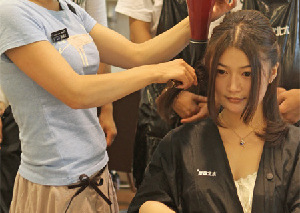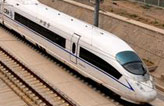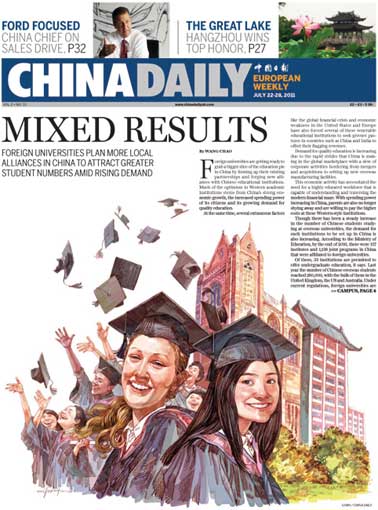Mixed Results
Updated: 2011-07-22 10:56
By Wang Chao (China Daily European Weekly)
"Such a pure academic institute cannot be duplicated in China, since it is not economically viable," Huang says. "At the beginning of every year, the center makes a budget and both Nanjing University and the Johns Hopkins sponsor it. It does not depend on tuition fees."
Chu says that most foreign schools want to increase their visibility in China, thereby shape global influence. "Good students are always the best resource to fight for among universities, and in a sense the quality of students decides the ranking of a school. So building a reputation worldwide is very important to attract the best students."
But very few joint programs are lucky enough to get financial support like the Nanjing-Hopkins Center. Most joint programs are still market-oriented, and tuition fees are the sole source of revenue.
"We have to add special value to our school, so that parents are willing to pay more to send their kids here. Once they think we are performing badly, we will have no applicants, and no revenue," says Shen.
Wu Yinghui, dean of the College of International Education, Minzu University of China, says that it is not wrong for joint programs to capitalize on students, as long as they can guarantee good quality.
"Market-oriented schools need to provide really good education to compete with others," Wu says. "But many of these so-called cooperation programs are just a guise to charge more tuition fees - just by adding some classes instructed in English and inviting several English-speaking teachers, they raise the tuition fees by several times. It goes against the grain of the original intention of joint programs," Wu says.
Although these joint schools claim they are more Western, they are still restricted by the gaokao system. The Ministry of Education does not allow them to recruit students other than through the gaokao channel. So many families who can afford the tuition fees chose to study overseas directly.
Graduates from joint programs are also facing another embarrassment. With a foreign degree earned domestically, they have found it hard to get the same treatment as overseas returnees. For example, overseas returnees are given Beijing hukou, or residency certificates, after finding a job in Beijing. The same, however, does not apply to these hybrid schools.
"Hybrid schools have a big market potential, since good educational resources are scarce in China," Wu says, predicting that these schools will have an impact on third-tier universities, which might close down for lack of students.
"For parents who are willing to pay more for international education, hybrid schools are a good alternative."
But he also points out that the government should not only approve these programs, but also regulate and supervise their operations. Otherwise, they will become just money-making machines, he says.
"If we don't act quickly and reform the current higher education system, more and more foreign universities will take over the education market."
E-paper

The perfect cut
Companies need to revamp, standardize to stave off quality challenges
Crowning achievement
Living happily ever after
Let there be smell
Specials

My China story
Foreign readers are invited to share your China stories.

90th anniversary of the CPC
The Party has been leading the country and people to prosperity.

Setting the pace in Turkey
China is building a 158-km high-speed railway in Turkey.
